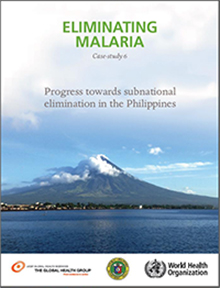
The National Malaria Control and Elimination Programme of the Department of Health in the Philippines has just launched a case study entitled “Eliminating Malaria: Progress Towards Malaria Elimination in the Philippines". The case study shows how the Philippines have successfully achieved to reduce malaria cases by three quarters from 2000 to 2011, with one third of provinces having eliminated malaria as of 2013. Today, very few people die from malaria in the Philippines.
This major decline in malaria is believed to be the result of several key actions: detecting early and treating people with malaria promptly; improving vector control; strengthening surveillance and epidemic management; scaling-up quality services; intensifying health promotion; ensuring a multi-sector approach to tackle malaria; and building local capacity to manage and sustain the Philippine malaria programme. The case study report outlines how the national malaria programme continues to strive for elimination and how its experience with malaria control and elimination can serve as a useful guide to other countries facing similar challenges.
The important progress made against malaria in the Philippines builds on years of hard work involving malaria control programmes and partners at municipal, provincial, regional and national levels. The World Health Organization (WHO) has provided technical and operational support to the Philippine malaria programme and The Global Fund, the Government of Australia and other partners significant financial support.
The Philippine case study was conducted by staff of the National Malaria Control Programme at the Philippine Department of Health in close collaboration with WHO malaria experts and researchers from the Global Health Group. The work was funded jointly by the Philippine Department of Health, WHO, the Bill & Melinda Gates Foundation and the Asia Pacific Malaria Elimination Network (APMEN).
The Philippines case study is part of a series of malaria elimination case studies developed by the WHO Global Malaria Programme and the Global Health Group, at the University of California, San Francisco. The series has also covered the countries Cap Verde, the Island of Reunion, Mauritius, Sri Lanka, Turkey and Turkmenistan.
